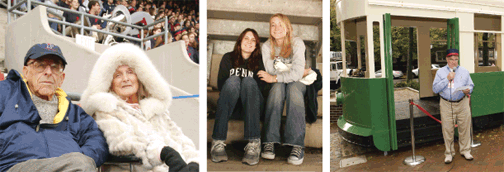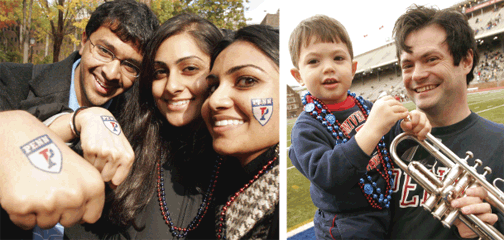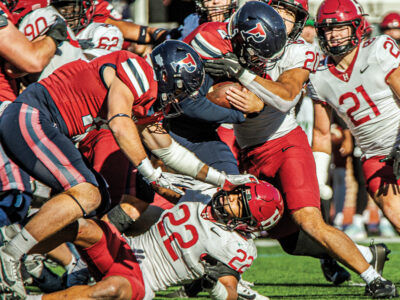This edition of Penn Alumni’s big fall weekend featured the Game (a tough loss to Princeton, unfortunately), the Awards of Merit Gala, and the finale of a year-long commemoration of the 125th anniversary of the University’s first African-American graduate, James Brister D1881.





125 Years After Brister, How Far Have We Come?
The year 2006 marked the 125th anniversary of the graduation of James Brister D1881, Penn’s first African-American alumnus. It was the 52nd year since Brown vs. Board of Education struck down the “separate but equal” defense of segregation practices. And last spring Penn became the first major research university that funds the bulk of its financial aid from its operating budget to announce that it was replacing loans with grants for students from families making less than $50,000 [“Gazetteer,” May/June 2006].
Just how far such steps have advanced the cause of racial equality—at Penn, in higher education generally, and in society at large— was the focus of panel discussions held over Homecoming Weekend that climaxed a year-long commemoration of Brister’s graduation [“Profiles,” Jan/Feb 2006].
In “Penn’s Compact with People of Color: Access to Education,” sponsored by the James Brister Society (which seeks “to improve the quality of the campus experience for students, faculty, and administrators of color”), panelists pointed out the barriers to equal educational opportunities and proposed ways to overcome them. In “The Black Family: Blueprint for a Brighter Future,” sponsored by the Black Alumni Society, the assembled speakers grappled with the obstacles of inner dissension, external pressure, and inequitable wealth distribution, healthcare, and educational opportunities.
Speakers on the education panel drew a distinction between the buzzword diversity and true inclusion. “I think of diversity as static, like the oxygen in this room,” said Gil Casellas L’77, an employment, discrimination, and workforce-diversity attorney who has served as chairman of the U.S. Equal Opportunity Commission. “It’s inescapable and beyond argument. The noun inclusion is, to me, a more apt one, because it requires you ask: ‘How do you appreciate and accept those differences?’ If you are truly diverse and inclusive, you will change. Folks in positions of power don’t always like to hear that message.”
“Diversity seems to me much more than having black and white and tan people sitting together,” followed Dr. Walter Palmer, a lecturer at the School for Social Policy and Practice. “If the University of Pennsylvania had a 25-percent African-American population, but their mentalities [are] the same as their Euro-American brothers and sisters, you have not done enough in terms of diversity. If they are not allowed to bring in their cultures, then diversity is lost.”
A theme in both discussions was how society may unwittingly (or intentionally) feed negative messages to traditionally neglected communities. At the panel on the black family, Michael Nutter WG’79, city councilman and current mayoral candidate in Philadelphia, said that in the school system, there “has been a lowering of expectations, or having no particular expectations, when people have certain information about these young people, whether it’s level of poverty, educational attainment, or performance in schools.”
Faulty assumptions also lead to an unfair stigma, noted Hon. Frederica Massiah-Jackson L’74, former president judge of the Philadelphia Court of Common Pleas. Speaking from experience, she noted that criminals and victims make up only a small percentage of the population, but “if you read some of our local media day after day, you start to think there’s not a good person left in this city, and especially not a good black person.”
Such media coverage affects the self-image of black people, which can manifest itself in identification with underachievement, added Nutter: “There are people in our community who say, ‘You’re trying to get all that education and you’re trying to act white.’ [The response should be:] ‘No, I’m trying to get a job.’”
Although that kind of peer pressure is a powerfully negative influence on youth in neighborhoods where positive examples are few and far between, equally strong is the sophistry involved in school tracking systems.
“If you track students very early, it doesn’t matter who they are; they take on the understanding that they’re not going to be successful and it becomes a self-fulfilling, counter-educational project,” said Penn President Amy Gutmann, who moderated the “Access to Education” panel and made an introductory speech for the “Blueprint” panel.
William Schilling C’66, Penn’s director of financial aid, bolstered Gutmann’s comments about the harm of lowering expectations for inner-city children who are unfairly perceived as less capable than their more privileged counterparts. “I think there has been success where schools have moved away from traditional tracking. Very often, talented young people get tracked out of the right path to college, very often because of race, and often because of class,” he stated.
Dr. Vivian Gadsden, the William T. Carter Professor in Child Development and Education at the Graduate School of Education, shared her method of challenging lowered expectations of teachers in lower socio-economic neighborhoods: “One of the statements I often make to teachers is, ‘Imagine that those children live in the suburbs and you have a child who isn’t reading; what would you do? Would you tell me that, ‘You can’t do anything?’ There’s a different level of persistence and tenacity.”
Dr. Bernard Anderson Gr’69, the Whitney Young Term Professor, Practice Professor of Management, and former assistant secretary for the Employment Standards Administration in the U.S. Department of Labor, quoted a Federal Reserve Board study to show economic disparities between black and white Americans. While “the median income of African-American families today is about 60 percent that of white families, the wealth of African-American families, measured by net worth, is less than 10 percent that of white families,” he noted. “White families have a median wealth of about $42,000. African-American families have a median wealth of less than $4,000.”
Anderson offered both external and internal reasons for the disparity. “The two major determinants for the rapid increase in the number of upper-income African-American families are education and employment opportunity.” However, he argued that wealth accumulation is hindered because black people on all economic levels “have the highest marginal propensity to consume [of any] population group in this country” and “the lowest propensity to save.” Furthermore, black people “don’t invest as much as white people, and when they invest they invest differently.” The principal source of wealth for black people, he explained, “are the homes that they purchase,” whereas “white people have far more investment in stocks, in bonds and financial assets.”
While residential real-estate values have increased over time, Anderson noted, “if you compare that increase with what’s happened in the stock market over the last 30 years, you see a significant difference.” Finally, he pointed out: “Much of the wealth of this country is accounted for by business enterprise. To the extent that there are fewer and smaller [black-owned] businesses, and businesses that are not growing as rapidly, that exacerbates the difference in wealth between the two communities.”
At least as troubling are the inequities that blacks face in the healthcare system. Dr. Loretta Sweet Jemmott GNu’82 Gr’87, director of the School of Nursing’s Center for Urban Health Research, cited Unequal Treatment: Confronting Racial and Ethnic Disparities in Healthcare, an Institute of Medicine study that concluded that people of color overwhelmingly receive lower-quality healthcare than whites of similar age, income, health condition, and insurance status. She supported the report with a personal anecdote: “I’m an educated woman with a Ph.D. from Penn, but when I got sick about five or six years ago and went to the ER in my jeans, a T-shirt, and curlers, the treatment I received was horrific. So I had to show my card and get the better treatment. But all people don’t have a card to pull out to get better treatment.”
Considering these difficulties, a vigorous support structure could help stabilize the black community by emphasizing positive behaviors. Palmer suggested that the church, traditionally a foundation of many black communities, could help by teaching people how to manage their money wisely, or by running extracurricular programs to keep children off the streets. After Anderson mentioned that African Americans shared a sense of unity despite their lower status in society, Nutter pointed to the collapse of this communality as a source of negative behavior in black youth.
“There was [once] this concept of growing up in a neighborhood where everyone had something to say about what you did and how you conducted yourself,” he said. “So whether my mother saw it or not, there was a lady down the street, someone across the street, or someone around the corner who basically had the right to say something to me, and if I gave them any lip I had to deal with them and I had to deal with it at home.” A lack of self-regulated discipline, he argued, has affected how young blacks respect authority, leading to conflict in academic and legal settings.
Blame may be counterproductive to fashioning solutions, but keeping these issues concealed from public discourse is equally detrimental. Anderson quoted a Talmudic proverb to illustrate the harm of ignorance: “If you don’t know where you’re going, any road will lead you there.”
—Carter Johns C’07
Award of Merit Recipients & Citations

Stanley N. Cohen, MD, M’60, HON’95
The co-inventor of DNA cloning, your work has made possible dozens of medical products, including synthetic insulin for those with diabetes, a clot-dissolving agent for heart attack victims, and a growth hormone for underdeveloped children. These and other lifesaving substances are now produced worldwide by your cloning methodology. Currently, you are the Kwoh-Ting Li Professor in the School of Medicine at Stanford University.
One might suppose that mastering enough chemistry and biology to become the “father of biotechnology” would not have left you much time for volunteering. In fact, while on your way to the National Inventors Hall of Fame, and after winning every award known to the cognoscenti of life science and technology, including the National Medical of Science and the Lasker Award, you took on a host of major leadership positions at Penn.
As a University Trustee, you volunteered on the Academic Policy Committee and Honorary Degrees and Awards Committee. At the same time, you made extraordinary contributions to PENN Medicine as a Trustee of the School of Medicine and the Health System, and as a member of the Medical School’s National Alumni Council.
A loyal member of the Medical Class of 1960, you inspired your classmates as a member of your 45th Reunion Committee. Over the years, you have hosted many Penn Medicine alumni events in the Bay area, attended dinners and receptions, and taken every opportunity to serve as a regional ambassador for Penn. Last year, you lectured at Penn on “The Cloning and Transplantation of Genes.” You demonstrate your belief in the importance of the future of medical education by supporting the Stanley N. Cohen Endowed Scholarship, the Bernard Cohen Memorial Lecture in Genetics, and as a member of the Harrison Society for planned giving donors.
In 1985, the Medical School recognized you with its Distinguished Graduate Award for lifetime achievement in the sciences. Ten years later, the University recognized your outstanding contributions to science and society by awarding you an honorary doctorate. Beyond Penn, you are a distinguished citizen of the nation and the world. You have been elected to the National Academy of Sciences, the American Association for the Advancement of Science, the American Academy of Arts and Sciences, and the National Foundation for Cancer Research.
Although genetic replication is your forte, it is abundantly clear that you are one of a kind. Penn Alumni is proud to present you with its highest accolade, the 2006 Alumni Award of Merit.
John C. Hover II, C’65, WG’67
To mention your name at the University Museum of Archaeology and Anthropology is to elicit a chorus of rave reviews. Museum insiders praise you for spearheading two campaigns, including the largest in the Museum’s history; providing invaluable help in the search for the new director; leading the gift effort in a tribute to the former director; and excelling in every way as Chair of the Museum’s Board of Overseers. With affection and gratitude, Museum leaders awarded you the Marian Angell Godfrey Boyer Medal for Extraordinary Service.
As a Penn undergraduate, majoring in English, you were already setting the pace –– not only as coxswain of the freshman crew team but as president of your fraternity, Psi Upsilon; a member of the Interfraternity Council; and business manager of Mask & Wig. After earning an MBA in marketing from Wharton, you embarked on a successful career as an executive of United States Trust Company of New York.
For the past 35 years, you have been a leading orchestrator of alumni activities in New York City. In the days before we had our own clubhouse, you took it upon yourself to bring area alumni together. After co-chairing the committee to raise the necessary funds, you became a cornerstone member of the New York Penn Club and have since held the positions of governor, vice president, and now president.
During your term as a Penn Trustee, you volunteered for the Proxy Subcommittee, Academic Policy Committee, External Affairs Committee, and Student Life Committee. Currently a member of the Alumni Council on Admissions Advisory Board and a member of the Penn Alumni Nominations Committee, you are a former member of the Penn Alumni Board of Directors and Council of Representatives. For twenty years you have interviewed prospective students and advanced Penn as a member of the Secondary School Committee. You are also a loyal member of the Loren Eiseley Society, Harrison Society, and Wharton Benjamin Franklin Society Committee. Throughout the University you are known as an eloquent speaker, an eager volunteer, and a genial host of Penn events.
As an enthusiastic and effective communicator, always ready to meet Penn’s needs and boost Penn’s strengths, you have long provided extraordinary leadership for the University. Penn Alumni is proud to present you with its highest accolade, the 2006 Alumni Award of Merit.
Sally Lyn Katz, C’82
To be hailed as Perfectly Penn by members of this great University is a compliment of the highest order. It is also a moniker that fits you to a “P.” The talent, energy, and enthusiasm that you bring to Penn as a volunteer were already evident in your student years when you helped found Bloomers – the nation’s first all female collegiate comedy group. While choreographing and acting your way through Penn, you also found time to be an active Resident Adviser, serve on the Student Judicial Inquiry Committee, make the Dean’s List, and earn a varsity letter in gymnastics. Your many contributions were recognized when you were elected to the Friars Senior Society, where you would become Friar of the Year in 2002. Following Penn, you earned a Master’s in computer education, training that you have used well in the service of Penn.
As an alumna with undiminished energy and purpose, you plunged right in, accepting the role of Vice President of Communications of the Young Alumni Board. At the same time, you served as President of the Friars Graduate Board, where today you fill the multiple roles of Historian, Scribe, Treasurer, Undergraduate Liaison, and Webmaster. For the past seven years, you have been an active member of the Penn Alumni Council. You have also been a member of the Secondary School Committee for twenty years, during which time you have personally interviewed hundreds of students, and you currently serve as its Chair. In addition, you serve as Co-Chair of the resurrected Penn Alumni Community Service Committee, also known as PennCares, and on the Alumni Class Leadership Council Board and the Penn Alumni Board of Directors. A shining member of the Class of 1982, you are Class President and Chair of Communications. As Chair of your 20th Reunion, your innovative communications methods, including the now universal reunion class website template you designed, led the effort that resulted in your class receiving the 2002 David N. Tyre Class Communications Award. An ardent supporter of The Penn Fund, you were a Co-Chair of its successful Project 5000, and you have cheerfully put in your time as a volunteer caller for their famous phonathons. You are also an active member of the Trustees’ Council of Penn Women and the Hillel of the University of Pennsylvania.
Spending 40 to 60 hours a week in the service of your alma mater, you are one of the single greatest forces for connecting alumni with each other and with Penn, while enriching dozens of student lives each year as a mentor. And you always make it fun. Not only are you President of Girdles, the Bloomers alumni group, but you also hold the exalted position of Managing Nut for Mixed Nuts, a comedy group composed mostly of former Penn Wiggers.
As if you could be more Perfectly Penn than all of that, you come from a devoted Penn family. With your father, Herbert Katz, W’51, you are part of the first father/daughter team to receive this Award. A trooper in every way, you are an astonishingly prolific and effective Penn volunteer. Penn Alumni is proud to present you with its highest accolade, the 2006 Alumni Award of Merit.
Joan M. Lau, EAS’92
An alumna with a mission, you are dedicated to creating new opportunities for alumni of all ages, races, and genders to engage with each other. In addition, you are helping to make sure that Penn leaders and volunteers represent today’s increasingly diverse student body. Through your service on the Penn Engineering Alumni Board and the Penn Alumni Board of Directors, you have helped to model a new composite face of leadership at Penn.
During your years as a Penn undergraduate, you demonstrated outstanding commitment and ability. Your many contributions as a student leader included serving as Vice President of the Engineering Student Activities Council, Vice President of the Bioengineering Society, Manager of Hill House, Manager of the Penn Student Agencies, and a member of the Student Committee on Undergraduate Education. For fun, you played in the Penn Band. After graduating, you continued your education at the University of Cincinnati, where you earned your Ph. D. Having matriculated into Wharton’s Executive MBA Program last May, you are now on your way to earning another Penn degree.
Enthusiastically embarking on your life as a Penn alumna volunteer, you took on the role of President of the revitalized Penn Club of Indiana, overseeing its successful reorganization and creating a celebratory Kick-Off Reception. Today you are a Member At-Large of the Penn Alumni Board of Directors. To date, your outstanding work for the Board has included establishing our Volunteer Opportunities Guide, with online links to over 50 opportunities for engagement across the University; serving on the Young Alumni Award Advisory Group; and co-chairing PennGALA, the Penn Lesbian Gay Bisexual Transgender Alumni Association, where you dedicated yourself to making Penn a welcoming and nurturing environment for all lesbian, gay, bisexual, and transgender students. You are also an active member of the Trustees’ Council of Penn Women. In addition, you brought exceptional dedication and an abundance of ideas to the Alumni Council on Admissions Advisory Board. In keeping with your goal of increasing diversity at Penn, you joined the University of Pennsylvania Asian Alumni Network and participated in the Global Alumni Network/Diversity Alliance Alumni Leadership Conference. A loyal alumna of Penn Engineering, you served on its Alumni Society Board and also as a judge in the Engineering Senior Design Competition last year.
Possessing vision and caring deeply about Penn, you have already taken great strides along a path of leadership that promises to be ever more rewarding. Penn Alumni is proud to present you with its highest accolade, the 2006 Young Alumni Award.
Marjorie Gordon Schaye, CW’75
It has been said that it would be impossible for the imagination to conjure a more spirited and enthusiastic Penn ambassador. A Phi Beta Kappa and Magna Cum Laude student in the last graduating class of the College for Women, you stayed closely connected to Penn for seven years as the organizer of the Penn Telethon. Since then, you have found many ways of putting your brains and vision to work for us. Most recently you joined the Board of Overseers of the School of Social Policy & Practice, where you are seen as embodying in your own life the School’s vision and values.
Your commitment is further evidenced by your leadership as former Vice President of Alumni Programming on the Penn Alumni Board of Directors, where you have also served on the Alumni Programming Committee and the Penn Alumni Executive Committee. You were the Founder and initial Co-President of the Midwest Regional Advisory Board and a former officer of the Penn Club of Chicago. A longtime member of the Trustees’ Council of Penn Women, you serve on its Executive Committee and are Co-Chair of the Programming Committee, and have in the past served on the Student Life Committee and as 15th Anniversary Co-Chair. Much of the success of the 125th Anniversary of Women at Penn Celebration was due to your impressive work as Chair of the Attendance Committee. As a lively participant on the Board of Trustees of Penn Press, you helped to make the Press better known to alumni. You also served for four years on the Agenda for Excellence Council. As an alumna, you have continued to direct outstanding students to Penn by conducting Secondary School Interviews; but you have not stopped there. Believing firmly in the importance of increasing accessibility to Penn, you are a member of the University Committee for Undergraduate Financial Aid and the creator of an endowed scholarship in memory of your Penn alumnus brother.
In addition to all this, and your work as a fundraising consultant, a yoga instructor, and a volunteer for various Chicago non-profit organizations, you still find time to attend and sponsor Penn events. You are already a Penn aunt, and you now join the ranks of proud Penn parents, as your son Andrew recently began his freshman year.
You are a remarkable team player of boundless energy and deep devotion, and your positive and generous spirit has endeared you to all. Penn Alumni is proud to present you with its highest accolade, the 2006 Alumni Award of Merit.




